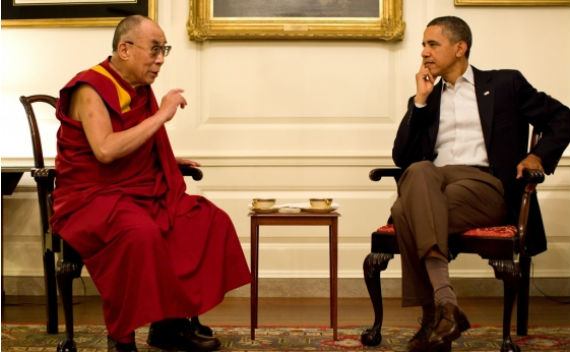The U.S. and China—Dialogue or Diatribe?
More on:

Is it ritualized noise or does China really mean it?
Here is what the Chinese Foreign Ministry had to say about President Obama’s July 16 meeting with the Dalai Lama: “We demand that the U.S. side seriously consider China’s stance, immediately adopt measures to wipe out the baneful impact, stop interfering in China’s internal affairs and cease to connive and support anti-China separatist forces…such an act has grossly interfered in China’s internal affairs, hurt the feelings of the Chinese people and damaged Sino-American relations.”
Did President Obama’s meeting with the Tibetan spiritual leader really “hurt the feelings of the Chinese people”? The reports of the meeting suggest two primary outcomes: President Obama telling the Dalai Lama that the United States does not support Tibetan independence, and President Obama reiterating his support for the maintenance of Tibetan culture. Both of these are supported by Beijing.
And here is what the People’s Daily had to say about the meeting between Admiral Mullen and General Chen earlier that same week, “The United States should understand that the obstacles to exchanges between the Chinese and U.S. militaries over recent years are not the lack of transparency in China’s military or the aggressive posture adopted by China. The root cause is the mentality of containment to which the United States has long clung, which lies behind its public statements. This has sometimes caused the nation to make moves threatening China’s core interests. Only a country that respects other countries can win their respect.”
The U.S. has no mentality of containment—although it probably would be fair to raise U.S. arms sales to Taiwan and reconnaissance missions off the Chinese coast as contributors to tensions in the Sino-U.S. military to military relationship. But does the Chinese government really believe that its lack of transparency and assertiveness in the South China Sea are not relevant to the challenges in military to military relations between China and the United States?
Beijing’s propensity for hyperbole and its frequent repetition of ideas and phrases that may not be relevant or even true reflect an effort both to define the terms of debate and to reinforce traditional policy thinking for domestic consumption. China’s leaders should realize, however, that they run the risk of being like the boy who cries wolf: when you keep repeating something that isn’t true, people eventually stop listening. The danger then becomes that when the wolf really does show up—when everyone really ought to listen to what Beijing says—no one will be paying attention anymore.
More on:
 Online Store
Online Store